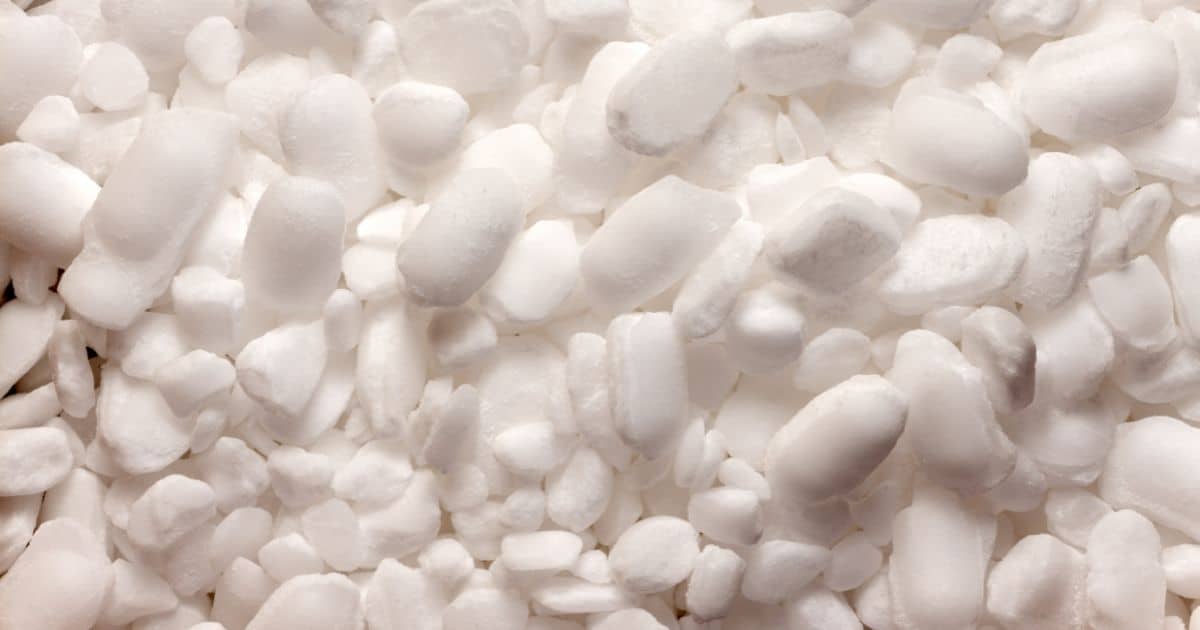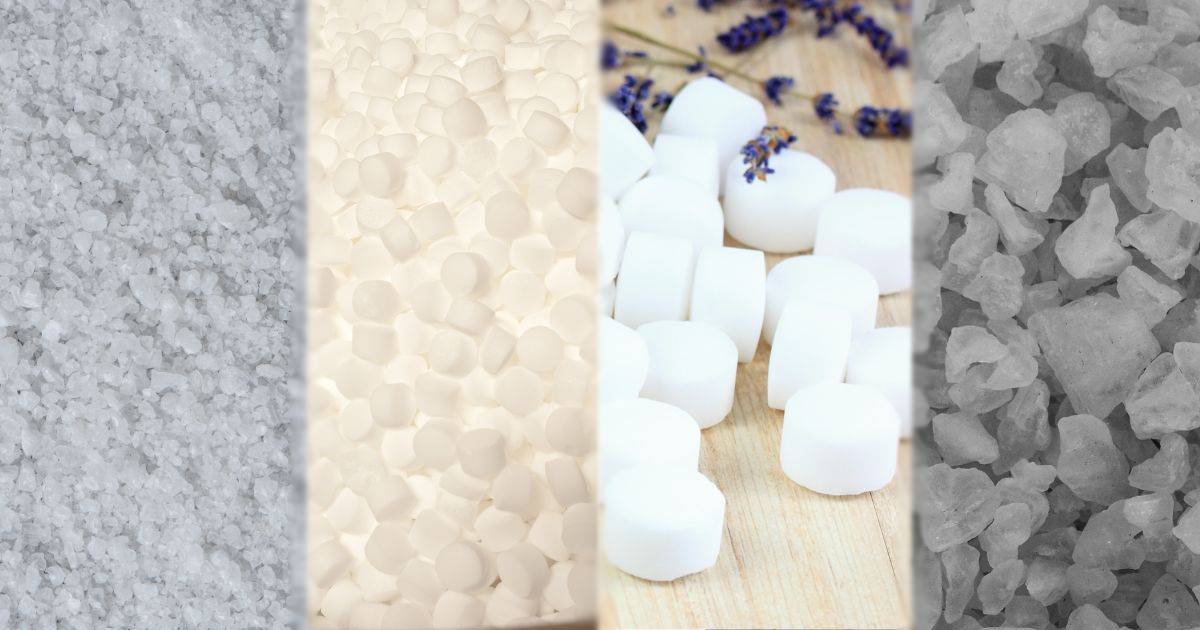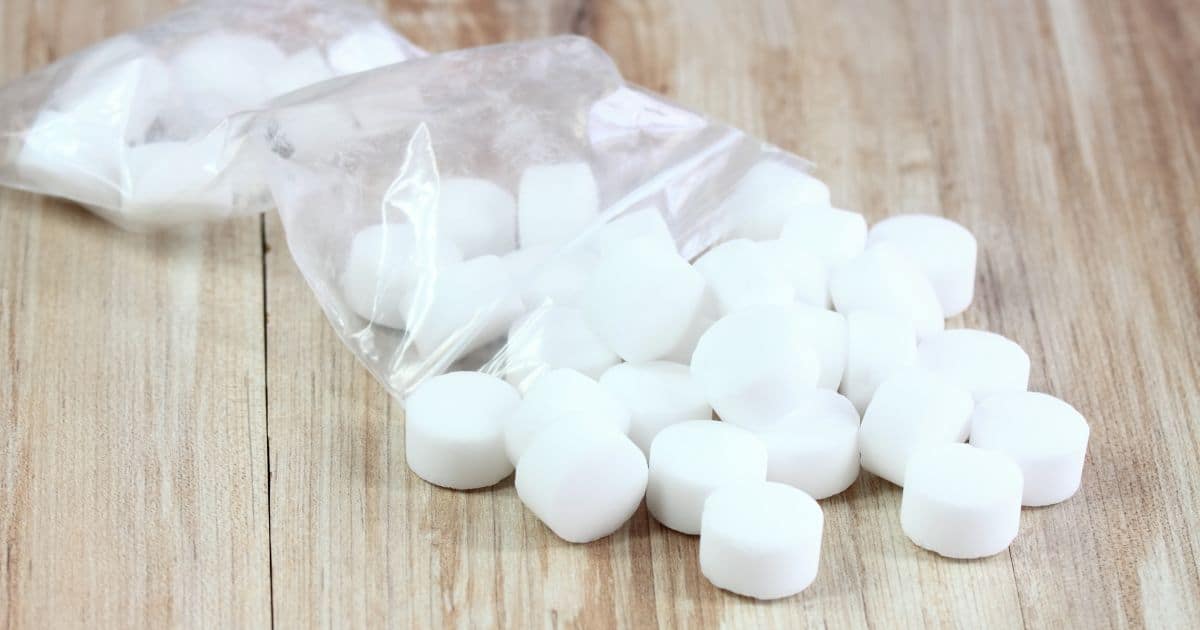We like to share product recommendations with you and hope you like them! Just to make you aware Water Filter Data may collect a small share of sales or other compensation from the links on this page.
If you reside in an area supplied with hard water, you should now know the need to install a water softener system. And if you have this system in your house, you should be used to refilling the brine tanks with salt.
But do you know the content of this salt or how it works? Have you ever asked yourself, “what is water softener salt?” If so, worry no more, as this complete guide will provide every detail you need to know about water softener salts, their forms, and how they work.
Keep reading as we’ll also discuss factors to consider when choosing a water softener salt.
What Is Water Softener Salt?

A water softener salt is used to make a brine, a solution that charges the resin beads. Remember that only charged resin beads can remove the mineral, causing water hardness.
And from general knowledge, brine is water saturated with sodium chloride (NaCl). So most water softener salts are made of NaCl.
While this is the same component as table salt, they appear in different forms. The primary reason is because of their noticeable difference in surface area. As a result, table salt should not be substituted with water softener salts in the brine tank.
Also, you may find that some manufacturers of water softener systems require you to use a different kind of salt. In this case, it could be Potassium Chloride (KCI). But KCl salts are not common.
How Does Salt Help to Soften Hard Water Levels?
All water softener systems rely on a mixture of salt and water, commonly referred to as a brine solution.
Once this solution is placed into the brine tank of traditional water softeners, it helps keep the resin beads inside charged. This removes unwanted minerals like calcium and magnesium from the hard water and improves the water quality.
As the salt water comes into contact with the resin beads in the brine tank, it stimulates an ion exchange process. During this process, any minerals in the hard water are removed and replaced with sodium ions released from the salt, producing softer water.
Over time, the resin beads get saturated with hardness minerals, limiting their function. As a result, you’ll need to regenerate the beads, or they will eventually stop working.
What Types of Salt Can Be Used in a Water Softening System?

You can add four salt forms to your water softener system. But note that these salt forms have different purity levels.
Also, you need to be careful, as the impure forms aren’t as effective during the water softening process. And they can lead to some non-soluble residues being left behind in the backflush tank. If this occurs, you will eventually need to take the plunge and remove any blockages by hand.
As you would expect, the purest salt forms are the most expensive. Below we list the four states of water softener salt.
Water Softener Salt Block
As the name suggests, this is simply a block of salt. It is available in different purity levels. But, you’ll need to discuss with your water softener manufacturer about using this type. This is because they will need to increase the water in the backflush tank.
Also, some NaCl water softeners cannot accommodate salt in this form.
Solar Salt Crystals
Solar salt crystals are among the purest options, as in most cases, it contains up to 99.6% salt. Compared to other salts with high purity, you will find that this is available at a pretty affordable price.
Although you’ll need to be careful because prolonged use of solar salt crystals can cause a build-up of sodium in the tank leading to blockages.
Evaporated Salt Pellets
Evaporated Salt Pellets provide you with salt in its purest form. Often these pellets are made up of 99.9% salt, slightly more than that of solar salt. So the risk of any build-up within your water softener system is limited.
But because these salt pellets are pure, they are the most expensive to use in water softener systems. However, if the amount of water you use is high, then the extra cost is worth ensuring that there aren’t any buildups in your system.
Rock Salt
Of all the four options we look at here, this is the least pure and the cheapest. The reason is that rock salt contains lots of non-soluble calcium sulfate. As a result, it can lead to a build-up that can cause blockages and bridges in the system.
If you have an all-in-one system, this isn’t the kind of salt you should use. Rock salts are best used in homes with low water usage.
Selecting the Right Salt for Use in Different Types of Water
 Softeners
Softeners
You should choose a salt that best meets your needs and your type of water softener. And here are factors to consider to determine which style best suits your needs.
How Hard Is the Water?
If the water is very hard, you must choose a salt with much higher purity. For example, for those who live in Phoenix, where water is considered very hard, you should consider using water softener salt in pellet form.
But, people living in areas with lower water hardness may use solar or rock salt instead.
Type and Size of Water Softener System
You will find that some systems are more compatible with certain kinds of water softener salt than others. The only way to determine which type to use is to ask the company installing the system for you.
Conclusion
If you read this far, you probably now understand that salts are essential components of water softener systems. Without them, the water will retain its hardness.
But, if you don’t know what salt to use, speak to a water softener technician. Such a person can determine by assessing your system, how much water you use, and the hardness.
We hope you have found this article helpful, giving you a better idea of water softener salts. Hopefully you can now answer the question that has been nagging at you – what is water softener salt?
 Softeners
Softeners


